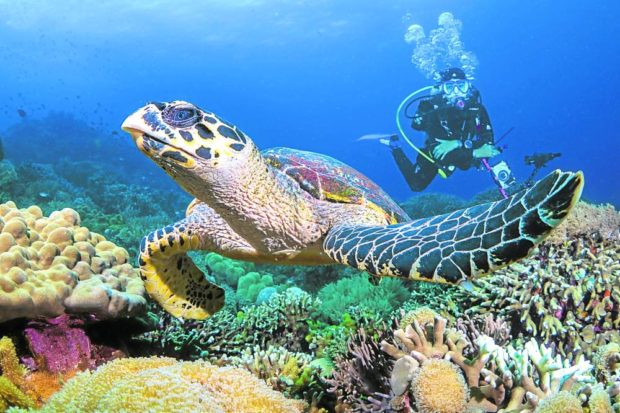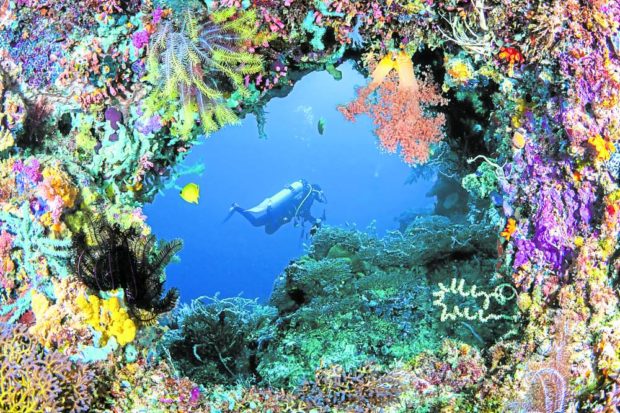
DIVE BUDDY | Diving with a green sea turtle is one of the main attractions on Apo Island off Dauin, Negros Oriental. These turtles breed along the beaches of the island and feed in its waters. (Photo courtesy of Dive7 Department of Tourism-Central Visayas)
DUMAGUETE CITY, Negros Oriental, Philippines — Jack Baller, a tourist and diving instructor from Miami, Florida, was in awe of what he saw during a recent dive off Apo Island.
“You won’t see any of these in Miami. [What you have here is] very clean. No trash at all [and the] reef was very pristine,” he said of the breathtaking underwater seascapes of the island off Dauin town in Negros Oriental province.
Baller shared that he had long wanted to see and explore the undersea wonders of Apo Island after he heard about it from a friend.
Located southeast of the capital city of Dumaguete in Negros Oriental, Apo Island is one of the top diving destinations in the country.
The island, which locals call “apo,” or grandchild of the bigger Negros Island, is 40 minutes away from the coastline of Dauin, and an hour away from Dumaguete. The Malatapay flea market along the coastline of Zamboanguita town is a popular jump-off point. From there, travel time will take around 40 minutes.
Apo Island can be reached via pump boats which can be rented from P3,500 to P8,000, depending on the number of passengers. Docking fee on the island is P300 per person, inclusive of swimming and snorkeling fees.
Different resorts offer Discover Scuba Diving (DSD) activities for first-time divers for P4,500, including the rental fee for the equipment.
In DSD, tourists are taught the basics of scuba diving as well as how to use equipment to get the most out of their firs underwater expedition.

Best spot
Apo Island has white sand beaches and 12 diving sites, the most famous of which is Coconut Point.
A sloping coral reef that can go down to as deep as 25 meters, Coconut Point is considered by advanced divers as the “greatest drift drive of the area” because the current can be strong and unpredictable.
Yet, divers marvel at its coral gardens, trevallies, and schools of big fish.
Coconut Point and other dive sites on Apo Island are visual delights teeming with marine life like starfish, anemones, schools of multicolored fish, and sea slugs navigating through the vibrant expanse of soft corals.
Since the island is also home to green sea turtles, tourists on the island may swim up close with them.
Pablo Quiza, a dive master from northern Spain, described the dive sites on Apo Island as “one of the best in the country.”
With its vast stretches of pristine coral reefs punctuated by diverse marine life, it joins the ranks of Cebu’s Moalboal and Palawan’s Tubbataha Reef Marine Park, a protected area in the middle of Sulu Sea, as among the best diving spots in the Philippines.
Main income source
Glenn Carballo, president of Negros Oriental Diving Association, said thousands of tourists used to visit Apo Island before the country closed its borders in 2020 due to the COVID-19 pandemic.
The influx of tourists provided livelihood to island residents. From tour guides and dive masters to souvenir and food entrepreneurs, tourists ensured revenue for locals.
Carballo estimates that 250 households on the island, with around 1,500 residents, depend on tourism money. They lost their main source of income when travel and health restrictions were imposed by the government as the pandemic raged in 2020 and 2021.
Carballo said tour guides and dive masters had to cross to the mainland to look for jobs at construction sites since there was no work on Apo Island for them. Others went back to fishing.
Analyn Alabata, 40, an island resident who sells shirts and other souvenir items aboard a kayak, said the pandemic wiped off their livelihood.
“Zero talaga kami. Nagtanim na lang kami ng kahit anong pwede naming makain (We had zero income. That was why we decided to plant anything that we can eat),” she said.
Now that pandemic restrictions had been lifted, Carballo said tourists were starting to return, albeit slowly.
Residents, she said, are glad because they can now get back on their feet.
Alabata, for one, said that with the arrival of tourists on the island, her daily income would average P500 while her husband resumed his job as a tourist guide.

PARADISE | Located southeast of the capital city of Dumaguete in Negros Oriental, Apo Island, offers tourists not just white sand beaches but 12 pristine dive sites. (Photo by JHIO JAN NAVARRO)
Marine sanctuary
Chad Moses Alanano, tourism support staff of Dauin, said the town welcomed 5,784 tourists last June.
Initiatives are also being done to further promote Apo Island and other tourist destinations in Negros Oriental to encourage people to visit and help Dauin hit its prepandemic arrival levels.
According to Carballo, resort owners have been attending dive shows and expositions in the country and abroad to gain tourism traction.
The Department of Tourism in Central Visayas is also supporting the local initiative by holding a travel trade as well as dive and media familiarization tours.
The agency recently held DIVE7 Festival that brought together local and foreign professional divers and dive enthusiasts in various diving destinations in the region, like Apo Island.
It included activities like a beach and underwater cleanup and underwater photography contest.
Carballo said efforts were being undertaken to ensure that Apo Island would be protected as a marine sanctuary.
“We tried to convince the locals not to overfish and not to hunt for small critters,” he said.
According to Carballo, locals are also being taught how to segregate trash, which are taken to the mainland for proper disposal. Strict rules on waste disposal are also enforced among tourists.
To ensure that the diving sites on Apo Island are not pushed beyond its capacity, an existing regulation is enforced to limit the maximum number of divers allowed on the island per day to 150.
With these preservation and protection efforts, the diver’s haven that is Apo Island, promises to captivate generations to come.
RELATED STORIES
Apo Island now open to beach lovers, travel enthusiasts
Pescador Island now open, tourists urged to help expedite rehab
Not only Lambug Beach, but also canyoneering in Badian to reopen this Feb.
